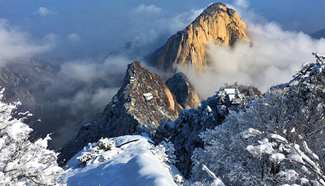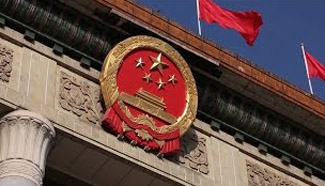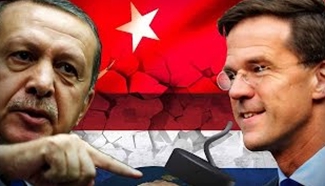By Victoria Argüello
CARACAS, March 14 (Xinhua) -- Ties between Venezuela and Peru have been strained since Peruvian President Pedro Pablo Kuczynski came to power in July 2016.
Pro-business and U.S. educated, Kuczynski has more in common with the Washington elite than with Venezuela's ruling socialists.
The former World Bank economist has been outspoken about his open support for political transition in Venezuela, and recently recounted how he told Venezuelan Foreign Minister Delcy Rodriguez "that her government was unsustainable, it has to go."
He has also compared Latin America to a docile dog lying at the foot of its master, the United States. "The U.S. focuses on areas that cause trouble, right? Like the Middle East and so on. It does not spend much time on Latin America, which is like a nice dog that's sleeping on the carpet. It's not causing anybody any problems."
The exception to that was Venezuela, he added.
In response, Venezuelan President Nicolas Maduro instructed Rodriguez to issue a note of protest "on behalf of the countries of Latin America and the Caribbean," and to summon Peru's ambassador to Caracas for consultation.
Milagros Betancourt, a former ambassador and now professor of International Law at the Andres Bello Catholic University, notes that "at this time, ties are at a very low point, there is annoyance in both countries and it does not appear as if it is going to get better in the near future."
She added, "I think ties will remain at a minimum."
In addition to Kuczynski's less than diplomatic remarks, Peru is backing an effort by Secretary General of the Organization of American States (OAS) Luis Almagro to increase the pressure on Venezuela's government, by reviewing a report on the "Venezuelan crisis."
The measure is a second attempt by Almagro to try to sanction Venezuela by declaring it in violation of the Inter-American Democratic Charter.
Political analyst Diego Sequera says "the role the Peruvian government is playing at this current regional juncture is sufficiently descriptive" to assume it has Washington's complicity.
"Pedro Pablo Kuczynski will dance to the tune that (Senator) Marco Rubio or any other U.S. senator belonging to the 'anti-Venezuelan lobby' plays," said Sequera, adding that faction "is quite impatient and in a hurry" to see political transition in the oil-rich South American nation.
Peru's unilateral actions, far from being chance events, form part of a concerted U.S. effort to impose its policies on Latin America, said Sequera.
Another motivating factor behind Kuczynski's "verbal combativeness" could be that a diplomatic spat serves as a convenient distraction at a time when he is in danger of being tainted by one of Peru's biggest corruption scandals.
Kuczynski served as economy and finance minister during the government of ex-president Alejandro Toledo (2001-2006), who is accused of accepting millions of dollars in bribes from disgraced Brazilian construction giant Odebrecht. Toledo has refused to come out of hiding in the U.S. to face the charges in his home country, alleging the accusations are politically motivated.
As Venezuela struggles to prop up an economy devastated by two years of plummeting oil prices, these destabilizing foreign factors could be decisive, the experts agreed.
Betancourt notes Venezuela lacks the financial resources to have the regional influence it once did, and it also lacks the support of former regional allies, such as Brazil and Argentina, where right-wing governments have come to power.
"Its influence and importance have diminished considerably, so it is no longer of relevance in the region, except to several English-speaking Caribbean countries that still rely on our oil generosity," said Betancourt.
Sequera believes the recent events are just a reflection of the policies pursued by the world's right-wing factions, which seek to "dismantle" sovereignty.
Since Venezuela's homegrown conservative opposition has been unable to turn recent electoral victories into real political gains, "the only thing left are foreign maneuvers and pressures," said Sequera.












